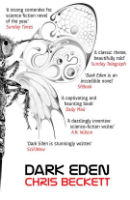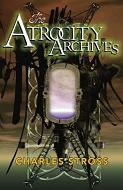 Chris Beckett is a British University Lecturer and SF Author, with, as this is written, 3 Novels and 2 short story collections to his name, plus a number of (non-fiction) text books.
Chris Beckett is a British University Lecturer and SF Author, with, as this is written, 3 Novels and 2 short story collections to his name, plus a number of (non-fiction) text books.
Dark Eden is the 1st book in the series of the same name, a sequel (Gela's Ring) is being published in instalments in Aethernet; I presume this will also be available as a single volume at some point.
The book was nominated for the BSFA award, and has won the Arthur C. Clarke award. Having said this, I have to tell you that I don't always agree with awards... A lot of people really like the book (thus the award, and a slew of hugely positive reviews) – for me it did not work. Thus Dark Eden presented me with a challenge – how do you write about a book which you think it well written, but didn't work for you at all as a story? I'm still not sure...
The story plays on a rogue planet (ie a wanderer, not in a solar system), where the 6th generation descendants of two lost space explorers are living their tribal, stone-age lives, counting their time in 'wombtimes' (except for the eldest ones, who still talk about 'years' – a pointless concept on a world without a sun!), living off the animals and plants in their isolated valley, and waiting for the Landing Veekle, which will have called for help with the RayedYo, so that they will be rescued and taken to the place where there is light in the sky (if you spot a religious reference here then you're absolutely correct).
The family is growing in numbers (food is getting scarce), and is growing more and more inbred, with some of the deformities now deadly for the babies (but the women will always churn out more, which seems to be their main role).
Language has badly deteriorated, not just for the now completely foreign technical concepts, but across the band. The society presented is hugely reactionary, not willing to change or move on from where their forebears told them the ship would return to, and not willing to move on in terms of development and new ideas. We seem to have lost nearly all knowledge of technology (and I means simple things, like wearing shoes, riding an animal, or using a cart).
But a young hothead is now about to change all that...
There are a number of areas I really liked about the book – first off, as you get into it, you encounter Beckett's great world-building, with a fascinating and dream-like world, lit up by its own creatures and fauna, and with a human society very unlike what we have (but very recognizably human!) living in it and off it. I could have done with more of this, and more depth to it, but as it stands this started to feel quite limited quite soon, and thus lost its fascination.
I also think that Beckett is a good writer, and that the book is rather well written (and no, that's not a contradiction with not liking it). He has a way with words, a skill in evoking moods, feelings, and settings which is, in my opinion, the book's main saving grace.
But I also have a good number gripes and issues with the book – some I've indicated above, but more there's also the fact that I felt that the Sfnal setting was incidental, except for the old myths (and a plot twist) this could be about any primitive society and its development (and I have read YA books which felt very very similar, without a setting in the future on a different planet).
The story feels very slow, like there is not enough plot to go round, and he had to stretch the scenes and events to make them last. Cutting maybe a quarter of the length by condensing the events might make this a much more readable effort for me, with much better pacing, even if it would not have helped that the developments feel overly predictable in most parts.
It also felt like this was a YA story - it reads like it, and not just because the main characters are 'newhairs' and discover their destiny through rebellion, although the amount of sex and some of the topics speak against this.
The characters came across as simplistic, and lacking depth, their developments were not always very logical, and happened in unrealistic jumps and bounds (yet, again, this reminded me of other YA novels exhibiting accelerated societal developments in stone age societies – does this make Dark Eden some kind of Cavemen in Space?)
And finally - did we really need another book showing that humanity is stupid, ignorant and wasteful; showing what happens when the stupid alpha-males start to disagree, squabble and wield their pointy sticks?
Did we really need another book reducing women to emotionally-driven baby factories?
Never mind that I disliked the religious theme/thread (Christian, for the record) woven through the story in references and allusions...
This book did not work for me – I'll stay away from Beckett for a bit for the future, I think.
Have a look at some other reviews out there on the Internet to see why other people liked the book – your taste might well differ from mine.
Title: Dark Eden
Author: Chris Beckett
Reviewer: Markus
Reviewer URL: http://thierstein.net
Publisher: Corvus Books
Publisher URL: http://www.corvus-books.co.uk
Publication Date: 2012
Review Date: 130718
ISBN: 9781848874640
Price: UKP 7.9
Pages: 404
Format: Paperback
Topic: Society
Topic: SF?













